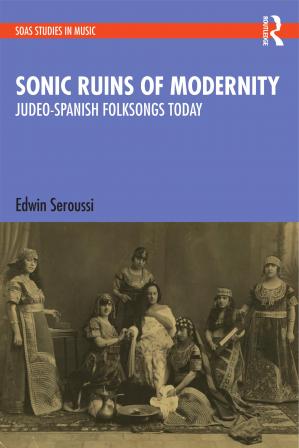1995
3. The Little Sister (Aḥot Qetanah)
La nación judía recita oraciones (The Jewish nation recites prayers)
This piyut belongs to the reshut ("permission") type that precedes the qadish opening of the eve of Rosh Hashanah service in Sephardic and Eastern synagogues. It was composed by Abraham Hazzan, whose name appears in the poem’s acrostic. He was a poet and synagogue cantor affiliated with the kabbalist circles of Gerona in the 13th century, The present song is a free translation of Aḥot qetanah into Ladino by Rabbi Reuben Eliyahu Yisrael (see above, no. 2). The poem retains the “quasi-muwashshah” structure (according to Ezra Fleischer's terminology) of the Hebrew original. It consists of stanzas, each with a different rhyme. The last line of the stanza, however, rhymes with the refrain derived from the opening stanza (aaaA, bbbaA, cccaA, etc.). The refrain became a traditional Sephardic blessing: “may the year end and its curses.” The last stanza (not included in our recording) ends with the additional refrain: “may the year start with its blessings” which does not belong to the original Hebrew poem but rather reflects the wish of the congregants to end this song with a positive message.
As expected, the melody that Rabbi Levy interprets corresponds to that of the poem Aḥot qetanah according to the Turkish Sephardic tradition. This melody is characterized by its slow, non-fixed pulse and melismatic ornamentation. Its form reflects the structure of the “quasi-muwashshah,” that is, a phrase repeated with all the verses of each stanza, followed by a contrasting phrase in the high register (all sung by the soloist) that precedes and announces the refrain (sung by the entire congregation) that is sung to the melody of the rest of the verses. The form is therefore: aab(soloist) A(congregation), aaab(soloist) A(congregation), etc. Note that in the recording a dim female voice is heard in the refrain, creating a responsorial effect.
La nación judía recita oraciones
ella entona sus alabaciones,
oh, Dio, melecina todas sus pasiones.
Termine la añada y sus maldiciones.
Ella a ti envoca con palabras dulces,
con cantes y loores que tú las mereces,
es ya tiempo que de ella te intereses,
ajenos si empatronan de sus posesiones.
Termine la añada y sus maldiciones.Sus enemigos sus bienes le robaron,
de su bien se hartaron y espejaron,
e con crueldades su corazón rasgaron,
y ella no abandonan sus tradiciones,
Termine la añada con sus maldiciones.
Estadvos tranquilos, tened esperanza,
no olvidó el Eterno su vieja aliancia,
a Sion nos subires con su ordenanza,
El realizará vuestras aspiraciones.
Termine la añada y sus maldiciones,
y empece la añada y sus bendiciones.






